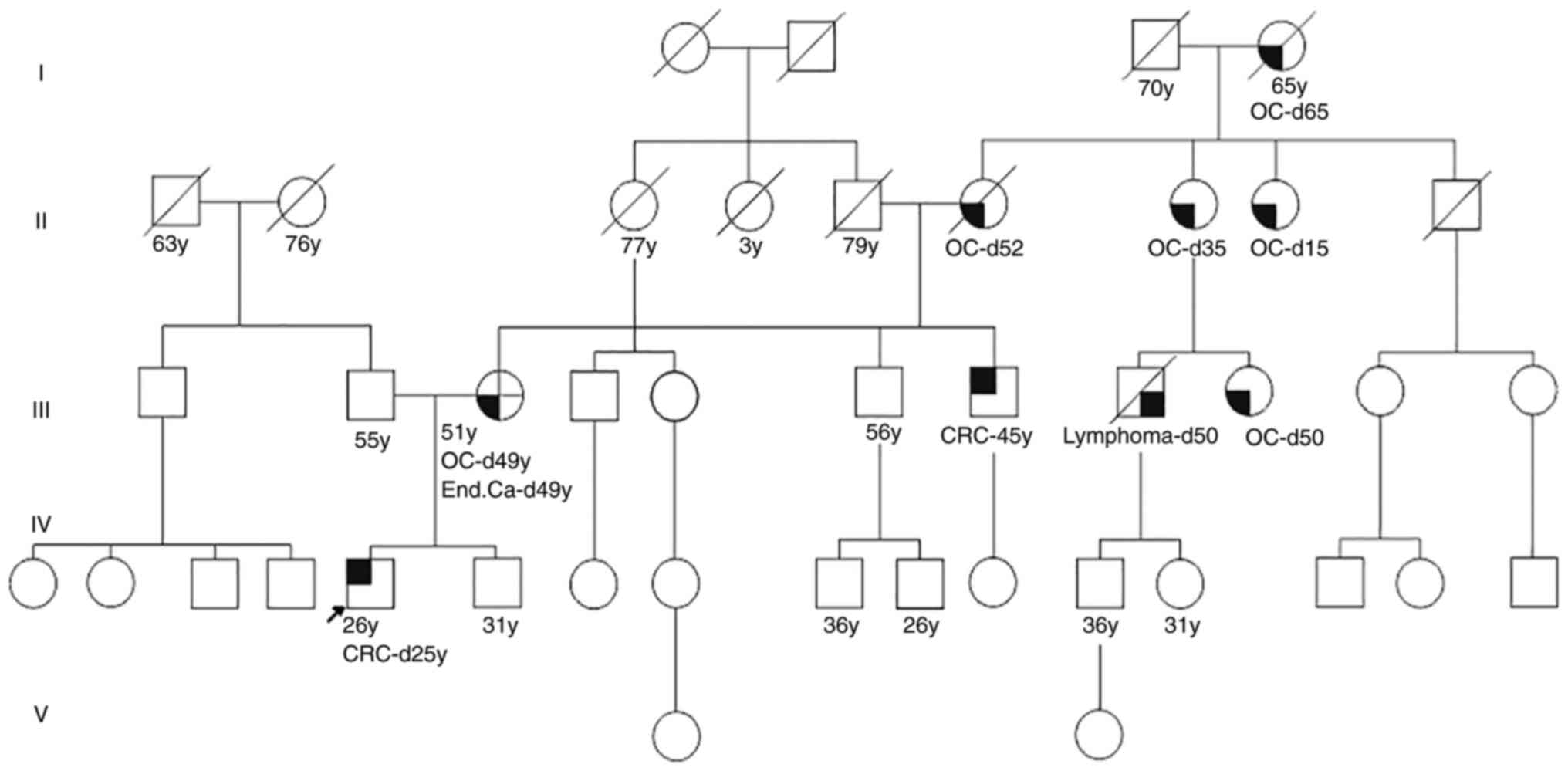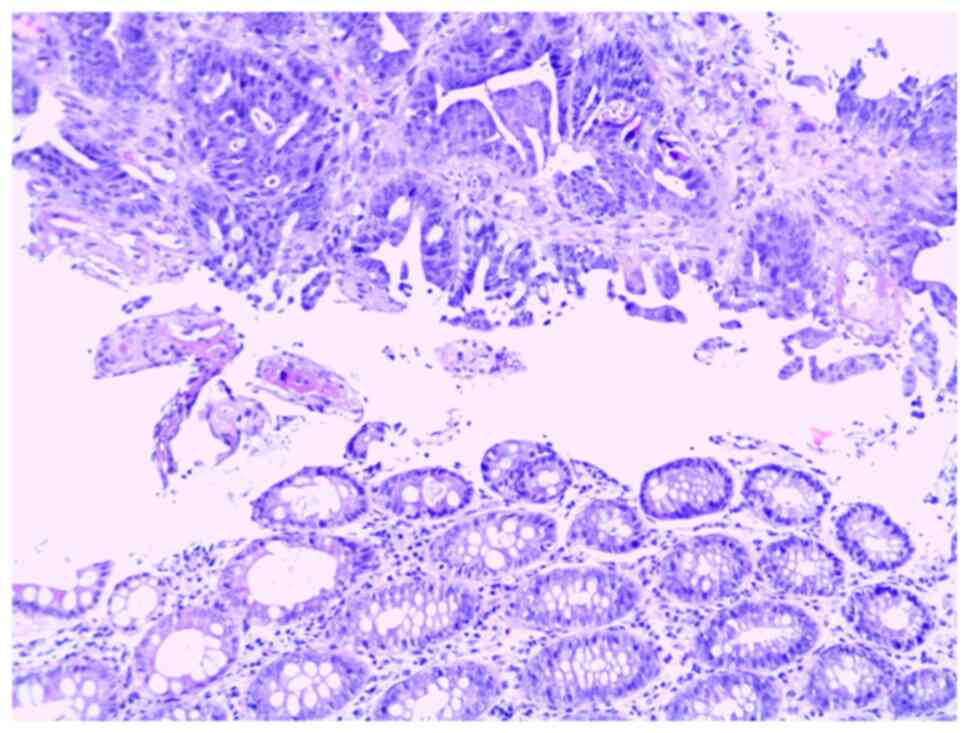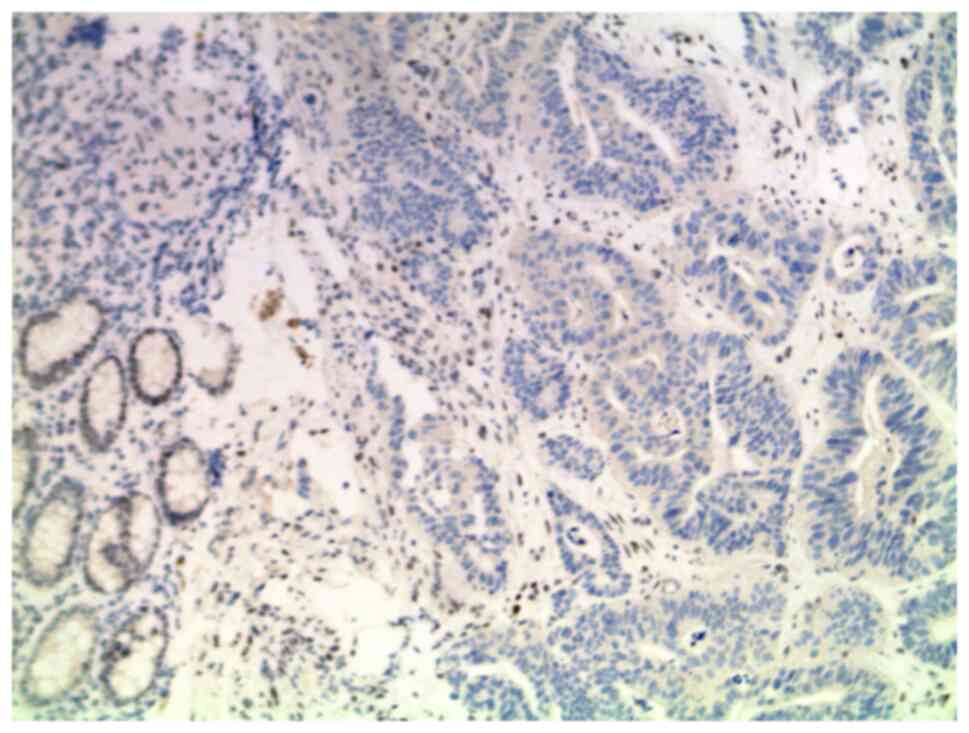|
1
|
Frankel W, Arends M, Frayling IM and
Nagtegaal ID: Lynch syndrome: Genetic tumour syndromes of the
digestive system. In: World Health Organization Classification of
Tumours of the Digestive System. 5th edition. IARC Press, Lyon,
2019.
|
|
2
|
Idos G and Valle L: Lynch syndrome. In:
GeneReviews® [Internet]. Adam MP, Ardinger HH, Pagon RA,
Wallace SE, Bean LJH, Mirzaa G and Amemiya A (eds). University of
Washington, Seattle, WA, 1993-2022.
|
|
3
|
Liccardo R, De Rosa M, Izzo P and Duraturo
F: Novel implications in molecular diagnosis of Lynch syndrome.
Gastroenterol Res Pract. 2017(2595098)2017.PubMed/NCBI View Article : Google Scholar
|
|
4
|
Payseur BA, Jing P and Haasl RJ: A genomic
portrait of human microsatellite variation. Mol Biol Evol.
28:303–312. 2010.PubMed/NCBI View Article : Google Scholar
|
|
5
|
Boland CR: Recent discoveries in the
molecular genetics of Lynch syndrome. Fam Cancer. 15:395–403.
2016.PubMed/NCBI View Article : Google Scholar
|
|
6
|
Chen ML, Chen JY, Hu J, Chen Q, Yu LX, Liu
BR, Qian XP and Yang M: Comparison of microsatellite status
detection methods in colorectal carcinoma. Int J Clin Exp Pathol.
11:1431–1438. 2018.PubMed/NCBI
|
|
7
|
Snowsill T, Coelho H, Huxley N,
Jones-Hughes T, Briscoe S, Frayling IM and Hyde C: Molecular
testing for Lynch syndrome in people with colorectal cancer:
Systematic reviews and economic evaluation. Health Technol Assess.
21:1–238. 2017.PubMed/NCBI View
Article : Google Scholar
|
|
8
|
Snowsill T, Huxley N, Hoyle M,
Jones-Hughes T, Coelho H, Cooper C, Frayling I and Hyde C: A
systematic review and economic evaluation of diagnostic strategies
for Lynch syndrome. Health Technol Assess. 18:1–406.
2014.PubMed/NCBI View
Article : Google Scholar
|
|
9
|
Wedden S, Miller K, Frayling IM, Thomas T,
Chefani A, Miller K, Hamblin A, Taylor JC and D'Arrigo C:
Colorectal cancer stratification in the routine clinical pathway: A
district general hospital experience. Appl Immunohistochem Mol
Morphol. 27:e54–e62. 2019.PubMed/NCBI View Article : Google Scholar
|
|
10
|
National Institute for Health and Care
Excellence (NICE): Molecular testing strategies for Lynch syndrome
in people with colorectal cancer: Diagnostics guidance [DG27].
NICE, London, 2020. https://www.nice.org.uk/guidance/dg27. Accessed April
24, 2020.
|
|
11
|
Ryan NAJ, McMahon R, Tobi S, Snowsill T,
Esquibel S, Wallace AJ, Bunstone S, Bowers N, Mosneag IE, Kitson
SJ, et al: The proportion of endometrial tumours associated with
Lynch syndrome (PETALS): A prospective cross-sectional study. PLoS
Med. 17(e1003263)2020.PubMed/NCBI View Article : Google Scholar
|
|
12
|
Crosbie EJ, Ryan NAJ, Arends MJ, Bosse T,
Burn J, Cornes JM, Crawford R, Eccles D, Frayling IM, Ghaem-Maghami
S, et al: The manchester international consensus group
recommendations for the management of gynecological cancers in
Lynch syndrome. Genet Med. 21:2390–2400. 2019.PubMed/NCBI View Article : Google Scholar
|
|
13
|
Vasen HF, Mecklin JP, Watson P, Utsunomiya
J, Bertario L, Lynch P, Svendsen LB, Cristofaro G, Müller H, Khan
PM, et al: Surveillance in hereditary nonpolyposis colorectal
cancer: An international cooperative study of 165 families. The
International collaborative group on HNPCC. Dis Colon Rectum.
36:1–4. 1993.PubMed/NCBI View Article : Google Scholar
|
|
14
|
Vasen H, Watson P, Mecklin J and Lynch H:
New clinical criteria for hereditary nonpolyposis colorectal cancer
(HNPCC, Lynch syndrome) proposed by the international collaborative
group on HNPCC. Gastroenterology. 116:1453–1456. 1999.PubMed/NCBI View Article : Google Scholar
|
|
15
|
Barnetson RA, Tenesa A, Farrington SM,
Nicholl ID, Cetnarskyj R, Porteous ME, Campbell H and Dunlop MG:
Identification and survival of carriers of mutations in DNA
mismatch-repair genes in colon cancer. N Engl J Med. 354:2751–2763.
2006.PubMed/NCBI View Article : Google Scholar
|
|
16
|
Rodriguez-Bigas MA, Boland CR, Hamilton
SR, Henson DE, Jass JR, Khan PM, Lynch H, Perucho M, Smyrk T, Sobin
L and Srivastava S: A national cancer institute workshop on
hereditary nonpolyposis colorectal cancer syndrome: Meeting
highlights and Bethesda guidelines. J Natl Cancer Inst.
89:1758–1762. 1997.PubMed/NCBI View Article : Google Scholar
|
|
17
|
Hampel H, Frankel WL, Martin E, Arnold M,
Khanduja K, Kuebler P, Clendenning M, Sotamaa K, Prior T, Westman
JA, et al: Feasibility of screening for Lynch syndrome among
patients with colorectal cancer. J Clin Oncol. 26:5783–5788.
2008.PubMed/NCBI View Article : Google Scholar
|
|
18
|
Seppälä TT, Latchford A, Negoi I, Sampaio
Soares A, Jimenez-Rodriguez R, Sánchez-Guillén L, Evans DG, Ryan N,
Crosbie EJ, Dominguez-Valentin M, et al: European guidelines from
the EHTG and ESCP for Lynch syndrome: An updated third edition of
the Mallorca guidelines based on gene and gender. Br J Surg.
108:484–498. 2021.PubMed/NCBI View Article : Google Scholar
|
|
19
|
Richards S, Aziz N, Bale S, Bick D, Das S,
Gastier-Foster J, Grody WW, Hegde M, Lyon E, Spector E, et al:
Standards and guidelines for the interpretation of sequence
variants: A joint consensus recommendation of the American college
of medical genetics and genomics and the association for molecular
pathology. Genet Med. 17:405–424. 2015.PubMed/NCBI View Article : Google Scholar
|
|
20
|
Available on: https://www2.tri-kobe.org/nccn/guideline/colorectal/english/genetics_colon.pdf.
(In Japanese).
|
|
21
|
Leclerc J, Vermaut C and Buisine MP:
Diagnosis of lynch syndrome and strategies to distinguish
Lynch-related tumors from sporadic MSI/DMMR tumors. Cancers
(Basel). 13(467)2021.PubMed/NCBI View Article : Google Scholar
|
|
22
|
Young J, Simms LA, Biden KG, Wynter C,
Whitehall V, Karamatic R, George J, Goldblatt J, Walpole I, Robin
SA, et al: Features of colorectal cancers with high-level
microsatellite instability occurring in familial and sporadic
settings: Parallel pathways of tumorigenesis. Am J Pathol.
159:2107–2116. 2001.PubMed/NCBI View Article : Google Scholar
|
|
23
|
Yamada R, Yamaguchi T, Iijima T, Wakaume
R, Takao M, Koizumi K, Hishima T and Horiguchi SI: Differences in
histological features and PD-L1 expression between sporadic
microsatellite instability and Lynch-syndrome-associated disease in
Japanese patients with colorectal cancer. Int J Clin Oncol.
23:504–513. 2018.PubMed/NCBI View Article : Google Scholar
|
|
24
|
Yearsley M, Hampel H, Lehman A, Nakagawa
H, de la Chapelle A and Frankel WL: Histologic features distinguish
microsatellite-high from microsatellite-low and
microsatellite-stable colorectal carcinomas, but do not
differentiate germline mutations from methylation of the MLH1
promoter. Hum Pathol. 37:831–838. 2006.PubMed/NCBI View Article : Google Scholar
|
|
25
|
Hemminger JA, Pearlman R, Haraldsdottir S,
Knight D, Jonasson JG, Pritchard CC, Hampel H and Frankel WL:
Histology of colorectal adenocarcinoma with double somatic
mismatch-repair mutations is indistinguishable from those caused by
Lynch syndrome. Hum Pathol. 78:125–130. 2018.PubMed/NCBI View Article : Google Scholar
|
|
26
|
Yurgelun MB, Kulke MH, Fuchs CS, Allen BA,
Uno H, Hornick JL, Ukaegbu CI, Brais LK, McNamara PG, Mayer RJ, et
al: Cancer susceptibility gene mutations in individuals with
colorectal cancer. J Clin Oncol. 35:1086–1095. 2017.PubMed/NCBI View Article : Google Scholar
|
|
27
|
Serrano D and Arteaga CE: Molecular
diagnosis of hereditary nonpolyposis colorectal cancer (Lynch
syndrome). Rev Fac Med. 64:537–542. 2016.
|
|
28
|
Pećina-Šlaus N, Kafka A, Salamon I and
Bukovac A: Mismatch repair pathway, genome stability and cancer.
Front Mol Biosci. 7(122)2020.PubMed/NCBI View Article : Google Scholar
|
|
29
|
Li X, Liu G and Wu W: Recent advances in
Lynch syndrome. Exp Hematol Oncol. 10(37)2021.PubMed/NCBI View Article : Google Scholar
|
|
30
|
Dominguez-Valentin M, Sampson JR, Seppälä
TT, Ten Broeke SW, Plazzer JP, Nakken S, Engel C, Aretz S, Jenkins
MA, Sunde L, et al: Cancer risks by gene, age, and gender in 6350
carriers of pathogenic mismatch repair variants: Findings from the
Prospective Lynch syndrome database. Genet Med. 22:15–25.
2020.PubMed/NCBI View Article : Google Scholar
|
|
31
|
Win AK, Jenkins MA, Dowty JG, Antoniou AC,
Lee A, Giles GG, Buchanan DD, Clendenning M, Rosty C, Ahnen DJ, et
al: Prevalence and penetrance of major genes and polygenes for
colorectal cancer. Cancer Epidemiol Biomark Prev. 26:404–412.
2017.PubMed/NCBI View Article : Google Scholar
|
|
32
|
Mangold E, Pagenstecher C, Friedl W,
Mathiak M, Buettner R, Engel C, Loeffler M, Holinski-Feder E,
Müller-Koch Y, Keller G, et al: Spectrum and frequencies of
mutations in MSH2 and MLH1 identified in 1,721 German families
suspected of hereditary nonpolyposis colorectal cancer. Int J
Cancer. 116:692–702. 2005.PubMed/NCBI View Article : Google Scholar
|
|
33
|
Auclair J, Busine MP, Navarro C, Ruano E,
Montmain G, Desseigne F, Saurin JC, Lasset C, Bonadona V, Giraud S,
et al: Systematic mRNA analysis for the effect of MLH1 and MSH2
missense and silent mutations on aberrant splicing. Hum Mutat.
27:145–154. 2006.PubMed/NCBI View Article : Google Scholar
|
|
34
|
Betz B, Theiss S, Aktas M, Konermann C,
Goecke TO, Möslein G, Schaal H and Royer-Pokora B: Comparative in
silico analyses and experimental validation of novel splice site
and missense mutations in the genes MLH1 and MSH2. J Cancer Res
Clin Oncol. 136:123–134. 2010.PubMed/NCBI View Article : Google Scholar
|
|
35
|
Baert-Desurmont S, Coutant S, Charbonnier
F, Macquere P, Lecoquierre F, Schwartz M, Blanluet M, Vezain M,
Lanos R, Quenez O, et al: Optimization of the diagnosis of
inherited colorectal cancer using NGS and capture of exonic and
intronic sequences of panel genes. Eur J Hum Genet. 26:1597–1602.
2018.PubMed/NCBI View Article : Google Scholar
|

















